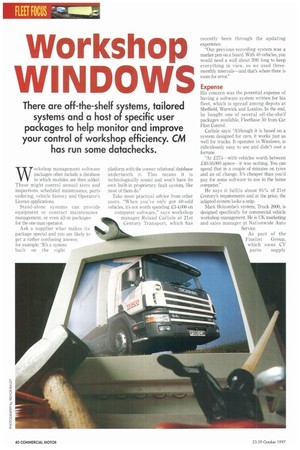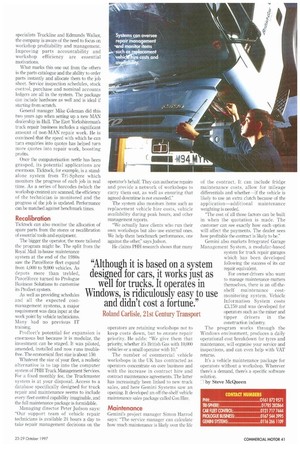Workshop WINDOWS
Page 42

Page 43

If you've noticed an error in this article please click here to report it so we can fix it.
There are off-the-shelf systems, tailored systems and a host of specific user packages to help monitor and improve your control of workshop efficiency. CM has run some datachecks.
Workshop management software packages often include a database to which modules are then added. These might control annual tests and inspections, scheduled maintenance, parts ordering, vehicle history and Operator's Licence applications.
Stand-alone systems can provide equipment or contract maintenance management, or even all-in packages for the one-man operator.
Ask a supplier what makes its package special and you are likely to get a rather confusing answer, for example: "It's a system built on the right platform with the correct relational database underneath it. This means it is technologically sound and won't have its own built-in proprietary fault system, like most of them do."
Take more practical advice from other users. "When you've only got 40-odd vehicles, it's not worth spending £3-4,000 on computer software," says workshop manager Roland Carlisle at 21st Century Transport, which has recently been through the updating experience.
"Our previous recording system was a marker pen on a board. With 40 vehicles, you would need a wall about 20ft long to keep everything in view, so we used threemonthly intervals—and that's where there is room for error."
Expense
His concern was the potential expense of having a software system written for his fleet, which is spread among depots at Sheffield, Warwick and London. In the end, he bought one of several off-the-shelf packages available, Fleetbase 50 from Car Fleet Control.
Carlisle says: "Although it is based on a system designed for cars, it works just as well for trucks. It operates in Windows, is ridiculously easy to use and didn't cost a fortune.
"At ,E275—with vehicles worth between £40-50,000 apiece—it was nothing. You can spend that in a couple of minutes on tyres and an oil change. It's cheaper than you'd pay for some software to use in the home computer."
He says it fulfils about 95% of 21st Century's requirements and at the price, the adapted system looks a snip.
Mark Holcombe's system, Truck 2000, is designed specifically for commercial vehicle workshop management. He is UK marketing and sales manager at Nationwide Auto Service.
As part of the Finelist Group, which owns CV parts supply specialists Truckline and Edmunds Walker, the company is aware of the need to focus on workshop profitability and management. Improving parts accountability and workshop efficiency are essential motivations.
What marks this one out from the others is the parts catalogue and the ability to order parts instantly and allocate them to the job sheet. Service inspection schedules, stock control, purchase and nominal accounts ledgers are all in the system. The package can include hardware as well and is ideal if starting from scratch.
General manager Mike Coleman did this two years ago when setting up a new MAN dealership in HulL The East Yorkshireman's truck repair business includes a significant amount of non-MAN repair work. He is convinced that the speed with which he can turn enquiries into quotes has helped turn more quotes into repair work, boosting profits.
Once the computerisation nettle has been grasped, its potential applications are enormous. Ticktock, for example, is a standalone system from Tr-Sphere which monitors the progress of each job in real time. As a series of barcodes (which the workshop creates) are scanned, the efficiency of the technician is monitored and the progress of the job is updated. Performance can be matched against benchmark times.
Recalibration
Ticktock can also monitor the allocation of spare parts from the stores or recalibration of essential tools and equipment.
The bigger the operator, the more tailored the program might be. The split from the Royal Mail in-house maintenance system at the end of the 1980s saw the Parcelforce fleet expand from 4,000 to 9,000 vehicles. As depots more than trebled, Parcelforce turned to Prologue Business Solutions to customise its Profleet system.
As well as providing schedules and all the expected costmanagement systems, a major requirement was data input at the work point by vehicle technicians. Many had no previous IT training.
Profleet's potential for expansion is enormous but because it is modular, the investment can be staged. It was piloted, amended, installed and now runs troublefree. The economical fleet size is about 150.
Whatever the size of your fleet, a realistic alternative is to tap into the computer system of PHI1 Truck Management Services. For a fixed monthly fee, the Truckmaster system is at your disposal. Access to a database specifically designed for truck repair and maintenance seems to include every fleet control capability imaginable, and the full maintenance package is formidable.
Managing director Peter Judson says: "Our support team of vehicle repair technicians is available 24 hours a day to take repair management decisions on the operator's behalf. They can authorise repairs and provide a network of workshops to carry them out, as well as ensuring that agreed downtime is not exceeded."
The system also monitors items such as replacement vehicle hire costs, vehicle availability during peak hours, and other management reports.
"We actually have clients who run their own workshops but also use external ones. We help them benchmark performance, one against the other," says Judson.
He claims PHI-I research shows that many
operators are retaining workshops not to keep costs down, but to ensure repair priority. He adds: "We give them that priority, whether it's British Gas with 10,000 vehicles or a small operator with 10."
The number of commercial vehicle workshops in the UK has contracted as operators concentrate on core business and with the increase in contract hire and contract maintenance agreements. The latter has increasingly been linked to new truck sales, and here Gemini Systems saw an opening. It developed an off-the-shelf vehicle maintenance sales package called Con Hire.
Maintenance
Gemini's project manager Simon Harrod says: "The service manager can calculate how much maintenance is likely over the life of the contract. It can include fridge maintenance costs, allow for mileage differentials and whether—if the vehicle is likely to use an extra clutch because of the application—additional maintenance weighting is needed.
"The cost of all those factors can be built in when the quotation is made. The customer can see exactly how each option will affect the payments. The dealer sees how profitable the contract is likely to be."
Gemini also markets Integrated Garage Management System, a modular-based system for truck repair garages which has been developed following the success of its car repair equivalent.
For owner-drivers who want to manage maintenance matters themselves, there is an off-theshelf maintenance costmonitoring system. Vehicle Information System costs £3,150 and was developed for operators such as the mixer and tipper drivers in the construction industry.
The program works through the Windows environment, produces a daily operational cost breakdown for tyres and maintenance, will organise your service and inspections, and can even help with VAT returns.
It's a vehicle maintenance package for operators without a workshop. Wherever there's a demand, there's a specific software solution.
–1 by Steve McQueen
















































































































